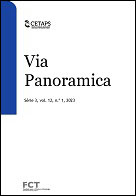Swede Levov
O Herói Trágico Americano de American Pastoral
Abstract
This essay aims to analyse the character of Seymour “Swede” Levov in the novel American Pastoral, written by Philip Roth and published in 1997, as the first book of Roth’s American Trilogy. For such, we start with an overview of the trilogy and provide background to the following works: I Married a Communist (1998) and The Human Stain (2000). Then we move on to an analysis of the protagonist of American Pastoral. The study of the character is divided in three sections: the first section studies the character in itself and his conception of the American Dream, whereas the second section looks into his relationship with his wife, in order to reflect upon the female condition in the 1960’s, as well as the role of the husband, from a feminist perspective. The third and fourth sections concern Swede’s daughter, Merry, in order to focus on their relationship, study the consequences of generation gap, and address how this father/daughter relationship may illustrate the Electra Complex, as proposed by Carl Jung. The fourth sections combined will contribute to understand what originated the tragedy of Swede Levov, a central theme in the novel.
Downloads
Published
How to Cite
Issue
Section
License
Copyright (c) 2023 Via Panoramica: Revista de Estudos Anglo-Americanos / A Journal of Anglo-American Studies

This work is licensed under a Creative Commons Attribution-NonCommercial 4.0 International License.




